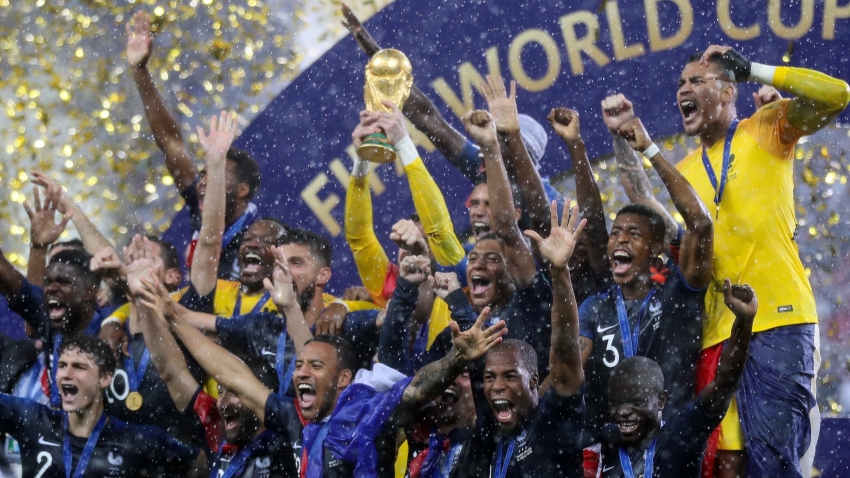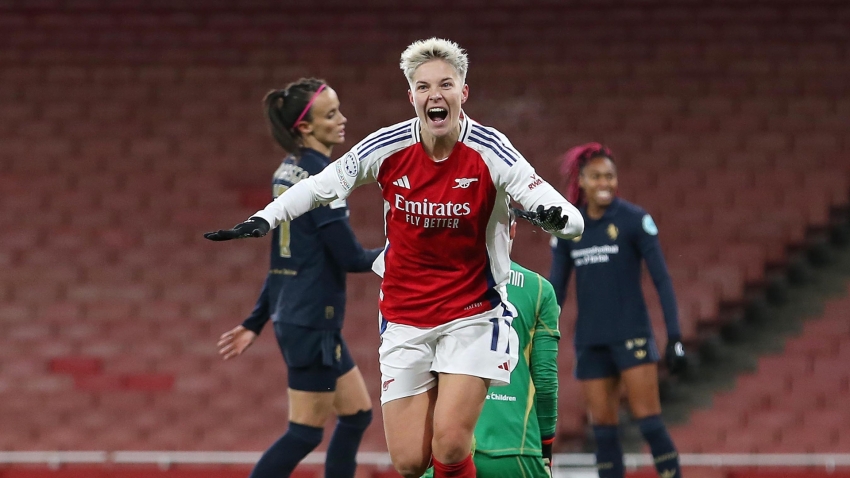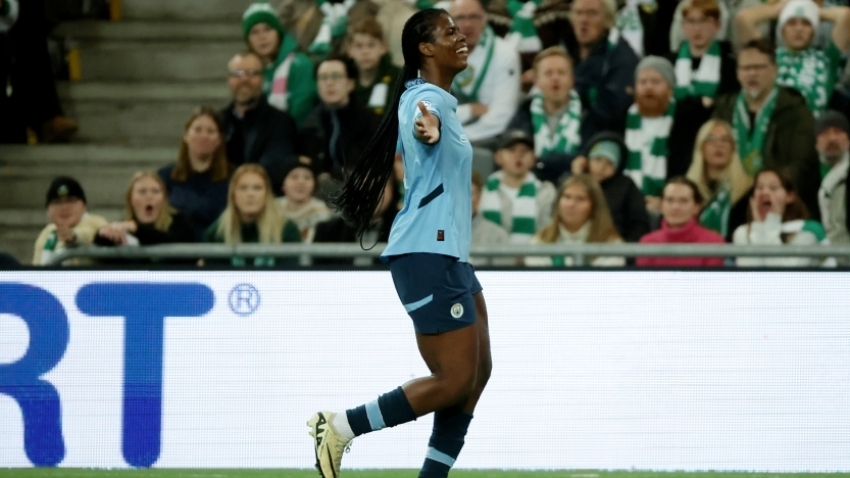It's nearly four years since Didier Deschamps became only the third man to win the World Cup as a player and coach, as he guided France to their second success on football's grandest stage.
The target now for Les Bleus is to become the first nation since Brazil in 1962 to retain their crown, and that journey begins on Friday with the draw for the group stage of Qatar 2022.
Four years is a long time to wait for anything, but the draw for the World Cup is always a milestone event that sees the anticipation taken up a notch.
The eyes of the football world will be on the Doha Exhibition and Convention Center, where the eight groups will be drawn and potential routes to December's finale can start being plotted.
But there is a little more to the draw than that…
How will the draw work?
Most of us have seen a draw and understand the general premise, but there's a lot of detail to consider before we end up with our completed group stage.
For starters, Friday's draw (19:00 local time) will only include 29 qualified teams, with the other three spots to consist of a couple of intercontinental play-off slot placeholders and one UEFA play-off slot placeholder, with those nations to be determined later in the year.
The qualified teams will be sorted into four pots of eight, with their FIFA world ranking determining which they enter – joining Qatar in pot one will be the top seven teams, while the nations ranked eight-15 will be in pot 2, and so on. The three play-off slot placeholders will be drawn from pot four.
There will also be eight pots representing the groups, A to H. Each group pot contains four balls with position numbers, ranging from one to four, which correspond to the teams' respective starting position in the tables and subsequently impact their fixture schedule.
Team pot one will be the first to empty, with Qatar automatically drawn into slot A1. The other sides from pot one will go straight into position one of the remaining groups.
From then on, a ball is drawn from a team pot and followed by one from a group pot, determining that team's position – for example, the second nation drawn into Group A could be placed in slot A4. The process continues until each team pot is emptied, with pot four the last to be drawn.
Where possible, no group will contain more than one team from the same qualification zone, with the exception of Europe – so anyone hoping for an encounter like Brazil v Uruguay will have to wait for the knockout stage.
Thursday's release of the latest world rankings confirmed the make-up of the respective pots, so, without any further ado, let's take a look through them…
The Pots
Pot One:
Qatar (hosts)
Brazil
Belgium
France
Argentina
England
Spain
Portugal
Pot Two:
Denmark
Netherlands
Germany
Mexico
USA
Switzerland
Croatia
Uruguay
Pot Three:
Senegal
Iran
Japan
Morocco
Serbia
Poland
South Korea
Tunisia
Pot Four:
Cameroon
Canada
Ecuador
Saudi Arabia
Ghana
Intercontinental play-off placeholder 1
Intercontinental play-off placeholder 2
UEFA play-off placeholder
Luck of the draw!
It goes without saying that, theoretically, being in pot one means you would be favourites to win your group. But that's the beauty of football; practically anything can happen once you're on the pitch.
If we look back to the last World Cup four years ago, defending champions Germany were top of the FIFA rankings and in pot one, but then failed to get through the group stage for the first time ever.
But just as being in a higher pot is no guarantee of going deep into the tournament, who's to say how eventual 2018 champions France would have fared had they been in pot two?
Les Bleus were ranked seventh at the time so squeezed into pot one ahead of Spain. While that arguably gave them a trickier route to the final in the knockout phase, perhaps the tests posed by Argentina, Uruguay and Belgium were what kept them sharp all the way to the end?
This time around, Spain do appear in pot one. Portugal do as well, with Fernando Santos' men benefiting in that regard from European champions Italy's shock absence.
Nevertheless, there are some powerful teams in pot two. The Netherlands and Germany are undoubtedly the pick of the bunch there, both of whom will provide a stern test for any of the teams in pot one. Brazil v Die Mannschaft in the group stage, anyone?
There's a chance we could even see a repeat of the 2018 final in the group stage, with Croatia (pot two) able to come up against France in the opening round, while an England v United States showdown would surely capture the imagination of fans on both sides of 'the pond'.
We can expect to see plenty of quality in pot three as well, especially with Serbia, Robert Lewandowski's Poland and African champions Senegal present.
Among those in pot four are Canada. They may only be competing in their second World Cup and first since 1986, but John Herdman's team have won plenty of admirers en route to winning the CONCACAF qualifying section and reaching a record high of 33rd in the rankings.
Excitement, expectations and exoduses as Ronaldo and Messi look likely to bow out
Whether watching football on TV or from the stands, it can often be easy to forget that our heroes are just ordinary people as well. They are individuals who in all likelihood had the same hopes and dreams as many of us as children.
The glitz and glamour surrounding professional football can lead us to put footballers on a pedestal, but behind the sport's shiny facade, our teams are made up of – and coached by – people who are just as obsessed with the idea of the World Cup as anyone else.
England manager Gareth Southgate encapsulated the excitement earlier this week, as he said: "[The World Cup evokes] a different sort of feeling, but it's still a tournament we all watched as kids, we all filled our wallcharts out, we all hoped and followed when England were there that we would do well. And it's a unique chance to make history, so that of course is massively exciting."
Of course, that innocent excitement harbours expectation and hope for many, for others there will be a feeling of responsibility to amend the wrongs of the past.
This time around, that's arguably truest when looking at Germany, with Manuel Neuer fully appreciating he may not get another opportunity to put things right.
"I know that I will probably not get to play many more World Cups, so after crashing out in 2018 in Russia and our exit against England [at Euro 2020], it's important that we show a new version of ourselves and visualise success," the experienced goalkeeper said.
That finality Neuer alluded to is another key aspect of the World Cup. Given the four-year cycle of the tournament, every time we bid a fond farewell to a few greats of the game who opt to take advantage of the cyclical nature and end their international careers.
This time it looks as though Lionel Messi and Cristiano Ronaldo – who for so long battled out their own personal 'Greatest of All-Time' rivalry – may be among those appearing on the World Cup stage for the last time.
"Goal achieved, we're at the Qatar World Cup. We're in our rightful place!" Ronaldo's Instagram post after Portugal's play-off success focused on the positive, but at 37, Qatar 2022 will surely be his final appearance at the tournament.
As for Messi, he said last week: "I don't know, the truth is I don't know. Let's hope [Argentina's preparations] go the best way possible. But for sure after the World Cup many things will change."
Exoduses after major international tournaments are common as teams reset or rebuild, but given what Messi and Ronaldo have represented on the pitch and the fact they've appeared at each of the previous four World Cups, their appearances at Qatar 2022 need to be savoured.
It all begins with Friday's draw, when narratives and talking points that'll live longer than any of us will start to take shape with the unscrewing of a few shiny plastic balls.
































